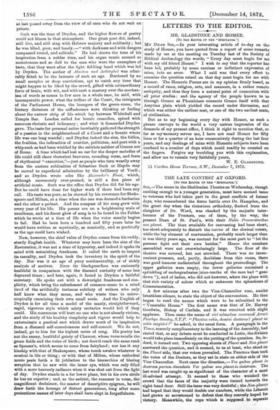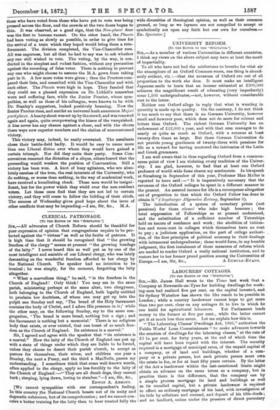THE LATE CONTEST AT OXFORD.
[To THE EDITOR OF THE " SPBOTATOE.1
Sim,—The scene in the Sheldonian Theatre on Wednesday, though exciting enough to a younger generation, must have seemed tame to veterans who had taken part in the great conflicts of former days, who remembered the fierce battle over Dr. Hampden, and the great day when the victorious orthodoxy, flushed from the slaughter of Dr. Ward, was checked by the majestic inter- ference of the Proctors, one of them, by the way, the present Dean of St. Paul's, with their Nobis Procuratoribus non placet. The time available for canvassing had been short, too short adequately to disturb the inertia of the clerical voters, while the lay element of convocation, probably much larger than it was thirty years ago, was content for the most part to "let the parsons fight out their own battles." Hence the numbers assembled were not overwhelmingly large. The floor of the theatre was covered, but not crowded. There was no incon- venient pressure, and, partly, doubtless from this cause, there was good humour undisturbed throughout the proceedings. The- upper galleries were empty, the lower galleries contained a sprinkling of undergraduates (nine-tenths of the men had " gone down "), and of ladies, who did not however, adorn the place with that rich variety of colour which so enhances the splendours of Commemoration.
A few minutes after two the Vice-Chancellor rose, amidst breathless silence, to state the object of the convocation. He then began to read the names which were to be submitted to the ".Venerable House." The first name was that of Dr. Harvey Goodwin, Bishop of Carlisle, and it was received with slight applause. Then came the name of viri admodwn reverendr Arturi Penrhyn Stanley, S.T.P. " Placetne noble, domini doctores? placet ne noble mayistri ?" he asked, in the usual form. A paragraph in the Times, scarcely complimentary to the learning of the Assembly, had stated that, as any debate must be conducted in Latin, the division would take place immediately on the putting of the question. So, in- deed, it turned out. Two opposing shouts of Placet and Non placet answered the question, and it seemed, to us at least, who stood on the Placet side, that our voices prevailed. The Proctora than took the votes of the Doctors, as they sat in state on either side of the Vice Chancellor. Next came the direction,— Vos quibus placet in dextram partem discedatis Vos quibus non placet in sinistram. The last word was caught up as significant of the character of a most ill-advised attempt. It seemed to those who watched the crowd that the faces of the majority were turned towards the right-hand door. Still the issue was very doubtful ; the Non-placets had hoped that they would double our numbers, while the Liberals had grown so accustomed to defeat that they scarcely hoped for victory. Meanwhile, the rope which is supposed to separate those who have voted from those who have yet to vote was being pressed across the floor, and the crowds at the two doors began to thin. It was observed, as a good sign, that the Non-pincet door was the first to become vacant. On the other hand, the Placets had been voting as slowly as possible, in order to give time for the arrival of a train which they hoped would bring them a rein- forcement. The division completed, the Vice-Chancellor rose. All was eagerness, but all that he had to say was to ask whether any one still wished to vote. The voting, by the way, is con- ducted in the simplest and rudest fashion, without any precaution against the recording of false votes. There is nothing to prevent any one who might choose to assume the M.A. gown from taking part in it. A few more votes were given ; then the Proctors com- pared their lists, and consulted with the Vice-Chancellor and with each other. The Placets were high in hope. They fancied that they could see a pleased expression on Dr. Liddell's somewhat worn and suffering face, while the Junior Proctor, whose sym- pathies, as well as those of his colleague, were known to be with Dr. Stanley's supporters, looked positively beaming. Now the Senior Proctor rises, and amidst an universal hush announces Majori partiplacet. A hearty shout was set up by the crowd, and was renewed again and again, quite overpowering the hisses of the vanquished. A hiss never has any chance against a cheer, and with the cheers there were now superior numbers and the elation of unaccustomed victory.
This victory may, indeed, be easily overrated. The assailants chose their battle-field badly. It would be easy to name more than one Liberal divine over whom they would have gained a certain triumph. Nor did they unite their party. Some Con- servatives resented the dictation of a clique, others feared that the proceeding would weaken the position of Convocation. Still a victory has been won. A knot of busy agitators, who are abso- lutely careless of the true, the real interests of the University, who do nothing, or worse than nothing, in the way of academical work, have received a humiliating check. These men would be insigni- ficant, but for the power which they wield over the non-resident voters. Let these once find that they are not led to certain victory, and they will cease to follow the bidding of their chiefs. The success of Wednesday gives good hope about the issue of other conflicts that may be impending.—I am, Sir, &c., M.A.











































 Previous page
Previous page